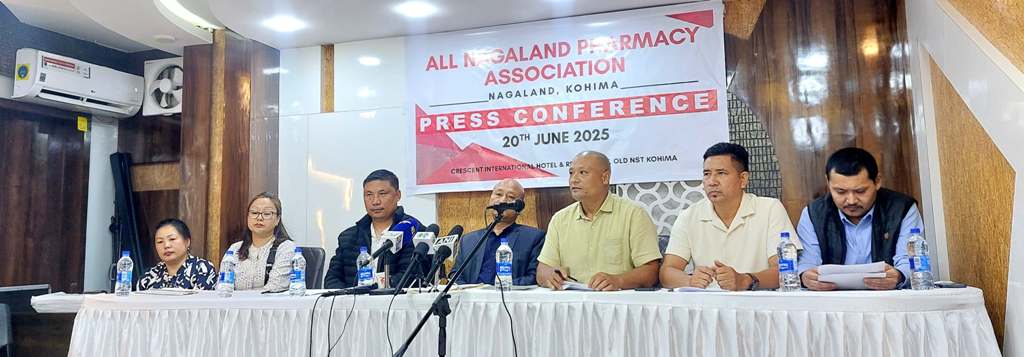The All Nagaland Pharmacy Association has appealed for relief from ongoing pharmacy closures, warning of a healthcare crisis in rural areas.
Published on Jun 20, 2025
Share

KOHIMA — The All Nagaland Pharmacy Association (ANPA) has called for urgent intervention and a reasonable extension of time in the wake of ongoing pharmacy closures ordered by the state government, citing non-compliance with regulations mandating the presence of registered pharmacists at every outlet.
Addressing a press conference in Kohima on Friday, ANPA leaders warned that the crackdown could severely disrupt healthcare delivery, particularly in rural and underserved areas.
The ANPA leaders—President Zhapuvilie Yashu, General Secretary Limayanger Jamir, and other district-level leaders including Pulitha Thur (Kohima) and Haizin Mpon (Peren)—voiced concerns over the cascading impact of the government’s crackdown.
Also read: Nagaland Police seize narcotics worth INR 15 crore in major drug crackdown
They said that despite having operated for decades under departmental supervision, many pharmacy owners are now being penalised without recognition of past practices and systemic lapses.
‘Victims of a broken system’
Yashu explained that most pharmacy outlets in Nagaland had received licences from the Health and Family Welfare Department with assigned registered pharmacists, some of whom were named across multiple outlets—a practice the department had long permitted.
According to him, pharmacies were never opened like vegetable stalls. Licences were issued under government oversight and renewed every five years, he said.
Jamir backed this claim by producing pharmacy licences and retention certificates, some valid until 2028, that were issued as recently as 2023 and 2024. ‘If this was illegal, why did the department continue renewing and issuing licences?’ he asked.
He pointed out that many pharmacies were unaware of any wrongdoing and operated in good faith under departmental guidance.
Pharmacies and pharmacists
Citing the February 2025 report from the department, Jamir said there are 1,157 pharmacies across Nagaland but only 278 registered pharmacists—a stark disparity that makes full compliance impossible under current circumstances.
‘Some entire districts such as Meluri and Shamator do not have a single qualified pharmacist. In Kohima alone, colonies like AG, Lerie, and Merhülietsa may be left without pharmacies,’ he said.
Jamir maintained that the problem has its origins in the absence of a pharmacy education institute in the state, resulting in a chronic shortage of qualified personnel. ‘This isn’t just about compliance. This is about survival—for both pharmacies and the people who depend on them,’ he added.
Public health at stake
The ANPA leaders warned that enforcing the regulation without an alternative plan will lead to "complete chaos" in the state’s healthcare system, especially in rural and sub-divisional areas.
Jamir stressed that pharmacies, many of which remained operational during the Covid-19 pandemic when government health units failed to meet basic supply demands, are essential frontline health providers.
The association criticised the government for failing to come up with a Nagaland-specific health policy and asked whether the Health Department itself could guarantee registered pharmacists in every government-run unit.
He pointed out that in some districts, even government health centres are manned by nurses given just three months’ training to dispense medicines. Similar flexibility, he maintained, should be extended to private pharmacies.
Plea for temporary relief
According to the association, it had approached various levels of government seeking dialogue, including the principal director, the commissioner and secretary of Health and Family Welfare, and even the chief minister. However, it received little or no response.
A meeting with the minister for Health was also denied, it informed, leaving the association to submit its representations through intermediaries.
‘Despite our willingness to comply with legal requirements, we’re being ignored,’ Jamir lamented. ‘We are not resisting the law, but we are saying Nagaland is not yet ready for full implementation of this policy.’
He added that ANPA was formed in March 2025 after efforts to engage the Nagaland Medical Dealers Association (NMDA) proved insufficient. While three districts—Dimapur, Chümoukedima, and Niuland—are yet to join, ANPA maintained that it holds no differences with NMDA and invited collaboration for the greater good.
While reiterating its commitment to public health, ANPA asserted that its members are already taking steps to ensure that certified pharmacists manage outlets wherever possible.
It called for the department to adopt transitional strategies such as: granting a reasonable extension of time to meet compliance requirements; launching short-term certification or bridge programmes in consultation with the Pharmacy Council of India; and framing a state-specific health policy that acknowledges Nagaland’s unique demographic and institutional challenges.
Jamir maintained that they are ready to cooperate. ‘But until the state has its own pharmacy institute and produces enough manpower, we request the government to allow us to serve the people without fear of persecution,’ he suggested.
ANPA asserted that until such a framework is in place, pharmacies should be allowed to function without disruption in order to avoid a breakdown in the state’s already fragile healthcare system.